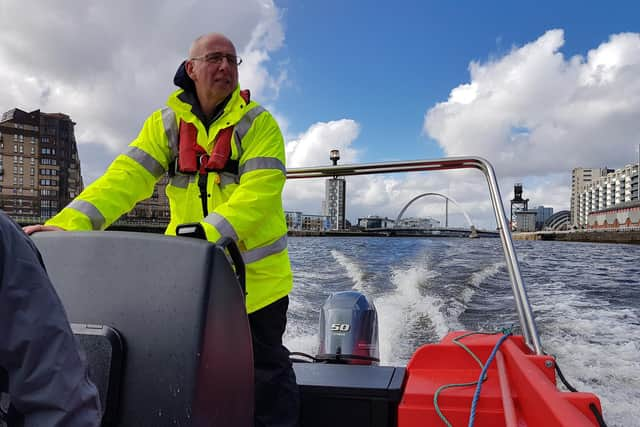Glasgow Humane Society offers shelter from the storm - Martyn McLaughlin
The world’s oldest life-saving body is one of Scotland’s most remarkable yet underappreciated institutions. It has rescued thousands of people over the years by plucking them from the depths of the Clyde and provided countless families with solace and closure by reuniting them with loved ones who could not be saved.
Such bonds run deep. Five years have passed since Gordon Goldie lost his daughter, Sarah, to the river. The society’s patrollers returned her body to dry land. Now, Mr Goldie is its vice-chair, and one of its most passionate advocates.
Advertisement
Hide AdAdvertisement
Hide AdHis name has become part of the society’s storied history, joining the likes of the Parsonages and Geddeses. All are united by the compassion and ideals which saw the organisation take shape as a product of the Enlightenment.
At the time of its formation in 1790, Robert Burns was writing Tam O’Shanter in Dumfries, and Mozart’s Così fan tutte was receiving its premiere. So too, the wider world was changing; the fall of the Bastille was celebrated on the fields of the Champs-de-Mars.
During this age, the society emerged as a response to punitive legislation which meant that those who tried to rescue someone attempting to take their own life risked being prosecuted themselves.
Members of the Royal College of Physicians and Surgeons of Glasgow rejected such legal and religious intolerance, and made provisions for the appointment of Nathaniel Jones as the nascent society’s first full time officer.
In return for a guinea a year, he was tasked with patrolling the shallow stretch of the Clyde spanning Finnieston and the Broomielaw, a course of water prone to flooding thanks to the crude infrastructure in place.


He did so with modest resources - a few simple vessels were lodged on the banks, and the society had sets of drags and stocks of blankets and towels, as well as handbarrows to carry those who could not be saved.
Much has changed in that respect over the intervening 231 years, though much remains familiar. The society has long struggled for money, and until it received its new, purpose-built vessel, it had to make do with a fibreglass boat that was ill suited to the Clyde’s fierce tempers.
It is all the more remarkable, then, to consider the outstanding service the society has given to Glasgow and its people. It may no longer assume responsibility for rescuing those who find themselves in the river, but over the course of more than two centuries, it has prevented many avoidable deaths and comforted families like the Goldies.
Advertisement
Hide AdAdvertisement
Hide AdThe society’s minutes, fastidiously documented by generations of officers and volunteers, offer a snapshot of a distant past. The 19th century record books in particular chronicle an age before health and safety, when horse and cart drivers tumbled from the riverbanks into the depths, workers fell to their deaths through rotten plans or broken girders, and daytrippers perished after collisions between boats vying for pace on the teeming Clyde.
Yet they also reveal tragedies that play out to this day: children playing in the shallows, only to be caught up in tidal weirs; revellers who paid the ultimate price for mistaking the gallusness drink afforded them for strength to fight the river’s might.
The most distressing accounts are of those lost souls who felt they had no other choice but to descend into its dark waters.
A January 1872 entry tells the story of Mary Duchar and her husband, Alex, a couple who had, according to reports, “not lived on the best of terms for some time past.” One night, they had a row. The next morning, Mary took her three children to the Clyde’s banks. The bodies of the youngsters - aged just three, two, and three months - were recovered later that day. All that was found of Mary was her footprints on the sandbanks.
Then there is the record from November 1879, when a grocer by the name of Alexander Sinclair left his counter, put on his hat and coat, and walked out of his busy shop, leaving behind a queue of bemused customers. He was found in the early hours of the following morning in the waters opposite Nelson’s Monument on Glasgow Green.
Or from three years later, there is the account of the Yorkshireman whose body was left by the receding tide in the shallows of the Gorbals. He had travelled to Glasgow in search of work, but fell into poverty. “To keep up a respectable appearance,” the minutes note, “he had on a small steel chain with a padlock, to appear as if he possessed a watch.”
The words used to describe such harrowing events - the young grocer, for example, was said to have been suffering from a “temporary derangement of the mind” - seem crude, if not callous in an era when the taboos around mental health are gradually being broken down.
But they speak to the kind of suffering to which so many people can still relate to. Suicide is extremely complex, but it is no accident that the frequency of tragedies detailed in the society’s minutes increased at times of economic hardship or war. The fate of those who did not make it was determined by forces mightier than any river.
Advertisement
Hide AdAdvertisement
Hide AdThe same ebb and flow is felt to this day. The society’s William Graham said that its crew had been a lot busier during the pandemic, a dreadful testament to the toll it has exacted on people’s mental health.
Like the river it patrols, the story of the Glasgow Humane Society is one of persistence and power. Nothing can hold it back.
Samaritans can be contacted for free, 24 hours a day, on 116 123. Visit samaritans.org for more information.
